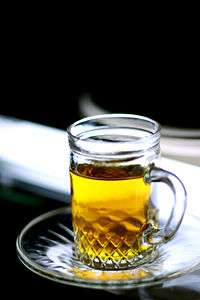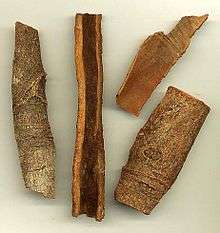Cinnamon tea
Cinnamon tea is an herbal tea made by infusing cinnamon bark in water.[1]
| Cinnamon tea | |
|---|---|
 | |
| Type | Herbal tea |
| Other names |
|
| Origin | Various |
| Quick description | Tea made from cinnamon bark |
| Korean name | |
| Hangul | 계피차 |
|---|---|
| Hanja | 桂皮茶 |
| Revised Romanization | gyepi-cha |
| McCune–Reischauer | kyep'i-ch'a |
| IPA | [kje.pʰi.tɕʰa] |
Regional variations
Chile
In Chile, té con canela ("tea with cinnamon") is made by placing a cinnamon stick into the teapot when steeping black tea.[2]
Korea

Gyepi-cha (계피차; 桂皮茶; "cinnamon tea") is a traditional Korean tea made from cassia cinnamon barks.[3] Thicker sticks of cinnamon with purplish-red cross-section and strong fragrance are used.[3] Dried cinnamon sticks are simmered either whole or sliced with a small amount of ginger.[1] When served, the tea is strained and optionally sweetened with sugar or honey, and then is usually garnished with minced jujubes.[1][3]
Lebanon
In Lebanon, shaayi bil qirfah wa’l yansoon’ ("anise and cinnamon tea") is made by boiling aniseed and cinnamon (powdered or sticks) in water.[4] Optionally, black tea may be added.[4] The tea is strained and served with or without added sugar.[4]
See also
| Wikimedia Commons has media related to Cinnamon tea. |
- Ginger tea
- Sujeonggwa – Korean cinnamon punch
References
- The Korea Foundation, ed. (2004). Korean Food Guide in English. Seoul: Cookand/Best Home Inc. ISBN 89-89782-10-4. Retrieved 20 September 2017.
- Campbell, Dawn L. (1995). The tea book. Gretna, LA: Pelican Pub. Co. p. 107. ISBN 1-56554-074-3. Retrieved 20 September 2017.
- "Gyepi-cha" 계피차. Doopedia (in Korean). Doosan Corporation. Retrieved 20 September 2017.
- Iyengar, Krishnaraj (21 July 2017). "The world in a teacup: brews that hit the spot". The New Indian Express. Retrieved 20 September 2017.
.